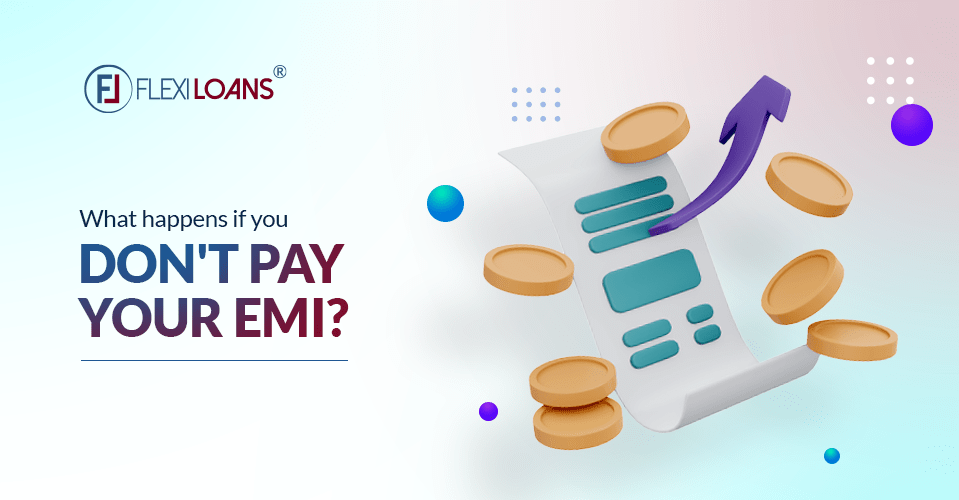May 23, 2022
Aug 01, 2025

Getting a term loan for business has become easy, particularly after the emergence of fintech NBFC companies offering loans in the simplest way possible. Everything happens online with little or no physical interaction.
That flexibility and versatility of the loan process without any collateral requirements is enticing people availing loans without much prudence. However, do they know what happens if an online loan is not paid?
Few borrowers bother to know all the terms and conditions of business loans. Here is a detailed blog that everyone should read before taking loans for new businesses.
What Happens If You Don’t Pay Your EMI?
There could be multiple reasons for missed EMIs, as listed below.
- Financial hardship
- Natural incidents
- Intention to delay or not to pay
- Restrictions on bank accounts by government agencies
Based on your default, the online business loan company divides loan default into two categories for taking further action against you.
What Happens if One EMI Is Not Paid? Minor Defaults
Minor defaults are those where borrowers paid the EMIs within 90 days of the due date. Here creditors give some leeway to the person to rectify their international or unintentional mistakes. In case of minor defaults, you suffer from reduced credit scores, late fees, and other not-so-hard actions.
What Happens if a Borrower Fails to Repay the Loan? Major Defaults
Any loan whose EMI is consistently missed from the last 90 days is considered a significant default. So let us say the due date is 01 January; you did not make payment by 01 March; hence, your loan gets categorised under major defaults by the financial institutions as per the instructions from the RBI.
Follow-up call/message from the creditors
Creditors send a call or message on your registered number for the payment unless you clear the due. It is a reminder, but also acts as a warning sign to pay the amount to avoid any drastic action.
Credit score impact
TransUnion CIBIL, Equifax, CRIF Highmark, and Experian are India’s major credit score companies. When you don’t make a payment after availing a term loan for business or any other loan, the creditors notify these companies to downgrade your score.
Thus, your credit score takes a hit. However, the good news is not every company reports missing one EMIs to the credit score company. Your credit score reduces by 50 to 70 points if they do so.
Next time, when you go on to avail a line of credit loan or any other business loan in India, creditors charge high-interest rates or might refuse to process the loan due to a bad credit report.
Late fee, GST, and more interest charges
Every lender states the total due and minimum due amount in the statement. You can pay the minimum due; however, in that case, they charge you a late fee. Missed EMI payment attracts late fees and GST.
Mental harassment by the recovery agents
Though it is not legal, it happens in the worst-case scenario if you don’t pay the EMI for your business loan. The recovery agents visit your home or office, call your close ones, warn you of legal actions and even pressurise you for loan recovery.
After declaring the loan as NPA, lenders sell their loans to asset management companies or other companies dealing with loan recovery.
Refinance
The lenders ask you to refinance the existing loan from another service provider, or they offer you the refinance. Here, you take another business loan with long terms and smaller installations to pay the existing loan.
Loan rescheduling
If your reason is genuine and lenders have faith in your business to bounce back, they reschedule the debt sometimes; they revise the interest rates and loan tenure so that you may pay the EMIs with ease.
What Happens If a Borrower Fails to Repay the Loan? The Extreme Case Scenario
Borrowers use all the available ways to get the loan repayment. Do not fall prey to easy loan availability and low-interest rates. Always avail MSME business loans, mudra loans, or any other loan from reliable institutions, and make sure to pay on time. In the extreme case scenario, lenders follow these routes.
Legal action or foreclosure for secured business loan
Based on the nature of a loan, like a secured or unsecured loan, lenders take legal action against you. They appear in court and ask for the loan foreclosure, allowing them rights on your assets and collateral properties. Later, they sell it to recover the loan from you.
Creating difficulties in future loan processing
Loans have become quite a requirement for businesses to run daily tasks, expand the functions, and several other reasons. Not paying one loan might prove so dearly that you will not get any loan in the future due to a bad score.
Bankrupt declaration for an unsecured business loan
If the loan is an unsecured or collateral free loan, they start legal proceedings against you for bankruptcy. In the past, you must have seen Bhushan Power & Steel, Reliance Communication, Diwan Housing finance, Essar Steel, and many more brought to court by lenders for bankruptcy.
The process takes time, but lenders get the loan payment according to the court ruling when you are declared bankrupt.
Wrapping Up
Defaulting on business loans has both short-term and long-term effects. Hence, it is advisable to be proactive and mindful while availing and paying loans. Even a single missed EMI might bring losses; thus, it is better to avail other available resources like asking from family/friends, using a credit card, and taking advances on loans/gold/insurance papers.







